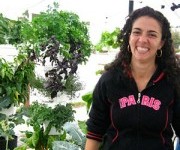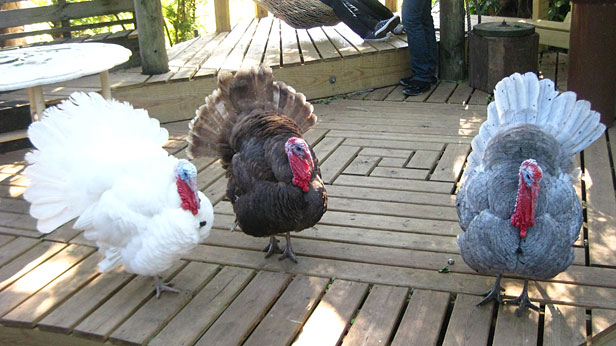 Earth ‘n’ Us, in Miami’s Little Haiti, has a plethora of turkeys and other animals running around. Photos: Natasha Bowens
Earth ‘n’ Us, in Miami’s Little Haiti, has a plethora of turkeys and other animals running around. Photos: Natasha Bowens
This is the last installment of Natasha Bowens’ Color of Food series for Grist. She will continue to explore agriculture, race, and class on her blog, Brown.Girl.Farming.
I eagerly wandered up and down the streets of Miami’s Little Haiti looking for any sign of a farm. If you’re familiar with Little Haiti — or any neighborhood in Miami, really — you’re probably thinking that a farm is the last thing I was going to find. Then I knocked on the door of a typical Miami home, painted a sandy yellow with a red-tiled roof, walked through the sun room and the kitchen and ended up in a not-so-typical backyard. It was like climbing through the wardrobe into Narnia.
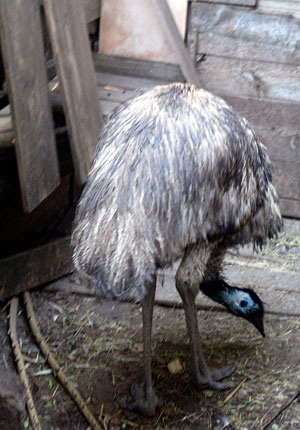 Emus are farmed for their meat — but stay away from the knifelike nail on their toes!Three turkeys were strutting around to Beethoven playing on a stereo, followed by an angry goose with his neck outstretched. Two large emus flashed their long eyelashes as they stared at me, the intruder.
Emus are farmed for their meat — but stay away from the knifelike nail on their toes!Three turkeys were strutting around to Beethoven playing on a stereo, followed by an angry goose with his neck outstretched. Two large emus flashed their long eyelashes as they stared at me, the intruder.
I had been transported to an urban paradise, designed to grow food by mimicking the natural ecologies of south Florida … OK, maybe minus the emu.
Earth ‘n’ Us is a permaculture farm that has been in this North Miami neighborhood for 33 years. When it began, Little Haiti was one of the poorest areas of the city and well-known for its crime and drug trade. Now Ray, the owner, is growing and expanding the farm to neighboring lots with help from members of the community.
Ray has already acquired an acre of land behind his house, on which you can find an abundance of fruit trees, like mangoes, avocados, bananas, and papayas, as well as two gardens growing everything from okra to beets and cabbage. The land also supports chickens, ducks, geese, goats, pigs, emus, turkeys, a python, and an iguana. (It’s just not Florida without snakes and lizards.) Tree houses for residents, renters and WWOOF volunteers overlook the gardens.
“Ray’s been here for so long, and he created this urban paradise just because he’s that kind of guy. But now he sees the need to expand and educate the kids in the neighborhood, and to produce more food for the community,” Matrice, a WWOOF volunteer who’s been studying permaculture at Earth ‘n’ Us for six months, told me. (Ray and Matrice wished to be known by first name only.)
Earth ‘n’ Us hosts workshops on various topics including permaculture design and home brewing, as well as movie nights and tours for the local kids. Its neighbor, Community Food Works, also offers courses on beekeeping and alternative energy solutions and runs a permaculture certificate program.
‘Ponics scheme
About 30 minutes north, another urban grower is trying to offer healthy food for the community and provide courses on how people can grow their own food using hydroponics.
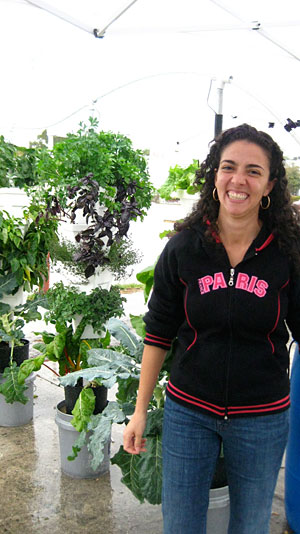 Jessica Padron started the Urban Farmer, a hydronics farm in an old auto shop. Jessica Padron started The Urban Farmer when she had her daughter Bella. “I wasn’t happy about the idea of not knowing for sure if our food was safe,” she told me. “So I researched a way to grow our own food that would require little maintenance and be easy for me as a working mom.”
Jessica Padron started the Urban Farmer, a hydronics farm in an old auto shop. Jessica Padron started The Urban Farmer when she had her daughter Bella. “I wasn’t happy about the idea of not knowing for sure if our food was safe,” she told me. “So I researched a way to grow our own food that would require little maintenance and be easy for me as a working mom.”
The hydroponics farm is built on an industrial site in Pompano Beach that was formerly an auto shop. Padron and her partners had to remove 300 yards of material out of the site to begin constructing the farm. They chose an outdoor hydroponics system because the soil at the site was so contaminated.
The system includes towers tiered with polystyrene containers that hold coconut husks for the plants to grow in. All that’s needed is a daily feed of water and a 16-nutrient solution, and they are cranking out over 10,000 plants. While I don’t agree with the Styrofoam containers or the cost of starting a hydroponics system (not really practical for your average food-desert resident), I was impressed with the amount of food being produced right there in an old auto yard in South Florida.
Legacy of injustice
It’s actually fitting that the end of my farming and food justice journey for this season has brought me to Florida. It is where I grew up and is home to my family, and it’s also home to many farmers of color that have emigrated here from the Caribbean and Central and South America.
Neighborhoods like Little Haiti and Little Havana in Miami are home to many such immigrants, but the rural areas that make up the majority of the state have also drawn large populations of Haitian and Latino immigrants with the promise of work.
The only problem is that some of the employers in these agricultural areas of Florida apparently think they’re the Spanish colonizers of 1565 … meaning slavery is OK in their book. Over the past decade, 12-plus employers in the state of Florida have been federally prosecuted for the enslavement of over 1,000 farm workers.
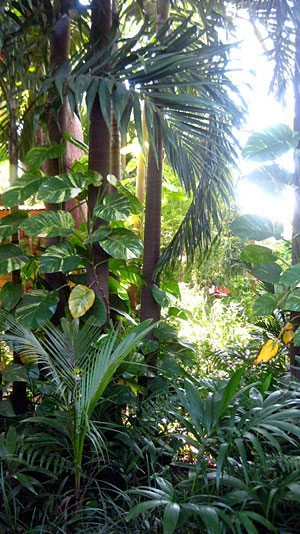 The jungle of South FloridaYes, I said enslavement. Workers have been chained and held captive in produce trucks, beaten, and shot, among other atrocities that are reminiscent of this nation’s past.
The jungle of South FloridaYes, I said enslavement. Workers have been chained and held captive in produce trucks, beaten, and shot, among other atrocities that are reminiscent of this nation’s past.
Immokalee, Fla., once home to the Calusa and Seminole Native American nations, is now the largest farm-worker community in the state. Immokalee has become infamous for the violation of human rights taking place on the tomato fields in the area, and the Coalition of Immokalee Workers has fought hard and in some cases successfully for improved wages and working conditions for the tomato pickers. [See Grist’s coverage here and here.] But farm workers here in Florida, and around the world, have been suffering from these injustices for years, and although some effort has gone into changing that, we still have a long way to go. The Coalition of Immokalee Workers continues to fight for the rights of its majority Latino, Haitian and Mayan Indian farm workers, and continues to investigate slavery in the fields today.
I just wonder if we will ever get past such blatant disregard for human rights as seen in Immokalee and erase the negative legacy that agriculture has seared into our minds for people of color.
While this trip has opened my eyes to some incredib
le and inspiring urban farming and food-justice projects being led by brown folks in under-served communities, the reality is that the issues within our food system are rooted in historical racial and economic injustice.
And unless we step together out of the shadow of denial and into the brutal light of honesty, we will only be repeating those patterns, and standing in the way of a truly just and healthy food revolution.
If you’re a farmer, urban grower, or food activist of color and would be interested in joining a national directory to put farmers of color on the map and strengthen the food justice movement, please leave a comment below or email me.

